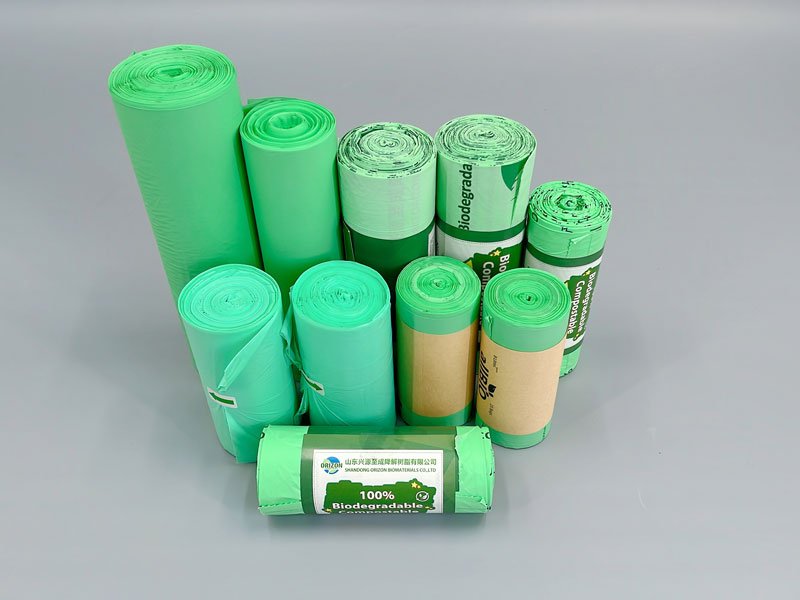Looking to reduce your environmental footprint but still need a reliable trash solution? Biodegradable garbage bags offer an alternative to traditional plastic while helping to lower long-term waste.
In this article, we’ll review the best biodegradable garbage bags in 2025, explain how they work, and help you decide if they’re right for your needs.

What Are Biodegradable Garbage Bags?
Biodegradable garbage bags are designed to break down naturally in the environment. Unlike conventional plastic trash bags that persist for hundreds of years, these bags decompose through microbial activity over time.
Key characteristics of biodegradable bags:
- Made from materials like PBAT, PLA, cornstarch blends, or oxo-degradable plastics
- Designed to degrade under specific conditions (heat, moisture, microbes)
- May not always be compostable
Important note: Biodegradable does not always mean eco-friendly. Some bags leave behind microplastics or require industrial composting conditions to degrade fully.
Top 7 Best Biodegradable Garbage Bags of 2025
1. GreenPolly Recycled Biodegradable Bags
- Size: 13 Gallon
- Material: 90% post-consumer recycled plastic + biodegradable additives
- Pros: Strong, affordable, partially recycled
- Best for: Daily kitchen waste
2. Hefty Renew Biodegradable Trash Bags
- Size: 30 Gallon
- Material: Oxo-biodegradable polyethylene
- Pros: Durable, trusted brand
- Best for: Yard waste, heavy-duty use
3. Repurpose Compostables Biodegradable Bags
- Size: 13 Gallon
- Material: PLA + PBAT blend
- Pros: Non-toxic, BPA-free
- Best for: Food scraps, office waste
4. Grove Co. Biodegradable Trash Bags
- Size: 4 Gallon
- Material: Plant-based PLA
- Pros: Stylish, clean scent, good for light waste
- Best for: Bathrooms or countertop bins
5. Earth's Natural Alternative Garbage Bags
- Size: 13 Gallon
- Material: Cornstarch blend
- Pros: Tear-resistant, unscented, safe for composting
- Best for: Green-conscious homes
6. UNNI Biodegradable Waste Bags
- Size: 3-13 Gallon
- Material: PLA + PBAT
- Pros: Certified compostable, sturdy
- Best for: Kitchen or office use
7. Hippo Sak Biodegradable Trash Bags
- Size: 13 Gallon
- Material: Recycled + biodegradable tech
- Pros: Reinforced bottom, made in USA
- Best for: General-purpose household waste
Biodegradable vs. Compostable Bags: What’s the Difference?
| Feature | Biodegradable | Compostable |
|---|---|---|
| Degrades Into | Microplastics or biomass | Water, CO2, biomass |
| Conditions Required | Sunlight, oxygen, time | Heat, moisture, microbes |
| Certification | Often none | ASTM D6400, EN13432 |
| Residue | Possible microplastics | No toxic residue |
Bottom line: Biodegradable garbage bags are suitable for people looking for partial eco-alternatives. Compostable bags are better for zero-waste goals.
How to Choose the Right Biodegradable Trash Bag
1. Understand Material Types
- Oxo-biodegradable: Regular plastic with additives (may leave microplastics)
- Plant-based blends: Cornstarch, PLA, PBAT are more eco-friendly
2. Check Degradation Claims
- Look for independent testing or certification like ASTM D6954 or similar
- Avoid greenwashing and vague "eco" claims
3. Determine Your Use Case
- Light-duty (bathroom/kitchen): Use thinner bags
- Yard or heavy-duty waste: Choose thicker, stronger bags
4. Storage & Shelf Life
- Keep in cool, dry areas
- Most biodegradable bags degrade over time—even on the shelf
5. Bulk & Pricing
- Buy in packs or cases for lower unit cost
- Wholesale biodegradable bag options available for businesses
Where to Buy Biodegradable Garbage Bags
Online Marketplaces:
- Amazon
- Grove Collaborative
- EcoRoots
Retail Stores:
- Walmart
- Whole Foods
- Target
For Bulk or OEM Orders:
- Direct from manufacturers
- Platforms like Alibaba or Made-in-China
Are Biodegradable Bags Really Better for the Environment?
- In landfills: Degradation is slow due to lack of oxygen and sunlight
- In the environment: May degrade partially but still release microplastics
- In industrial composting: Some perform well, but few municipal programs accept them
Best practice: Use biodegradable bags only when compostable ones are not an option, and dispose of them in suitable waste streams.
Eco-Friendly Alternatives to Biodegradable Trash Bags
- Compostable Trash Bags – Certified for full compostability
- Reusable Bin Liners – Washable cloth liners for dry waste
- Paper Bags – Great for dry or recyclable waste
- No-liner methods – Dump food scraps directly into compost bins
Conclusion
Biodegradable garbage bags can be a practical, transitional step toward reducing plastic waste—especially when compostable solutions are not accessible. For light to moderate household use, these bags offer durability and some level of environmental benefit.
However, it's crucial to be aware of what "biodegradable" really means and avoid falling for misleading labels. Always check materials, certifications, and disposal instructions.
Want to shop smart and green? Choose from the top-rated biodegradable garbage bags above and make an informed eco-friendly choice in 2025.





